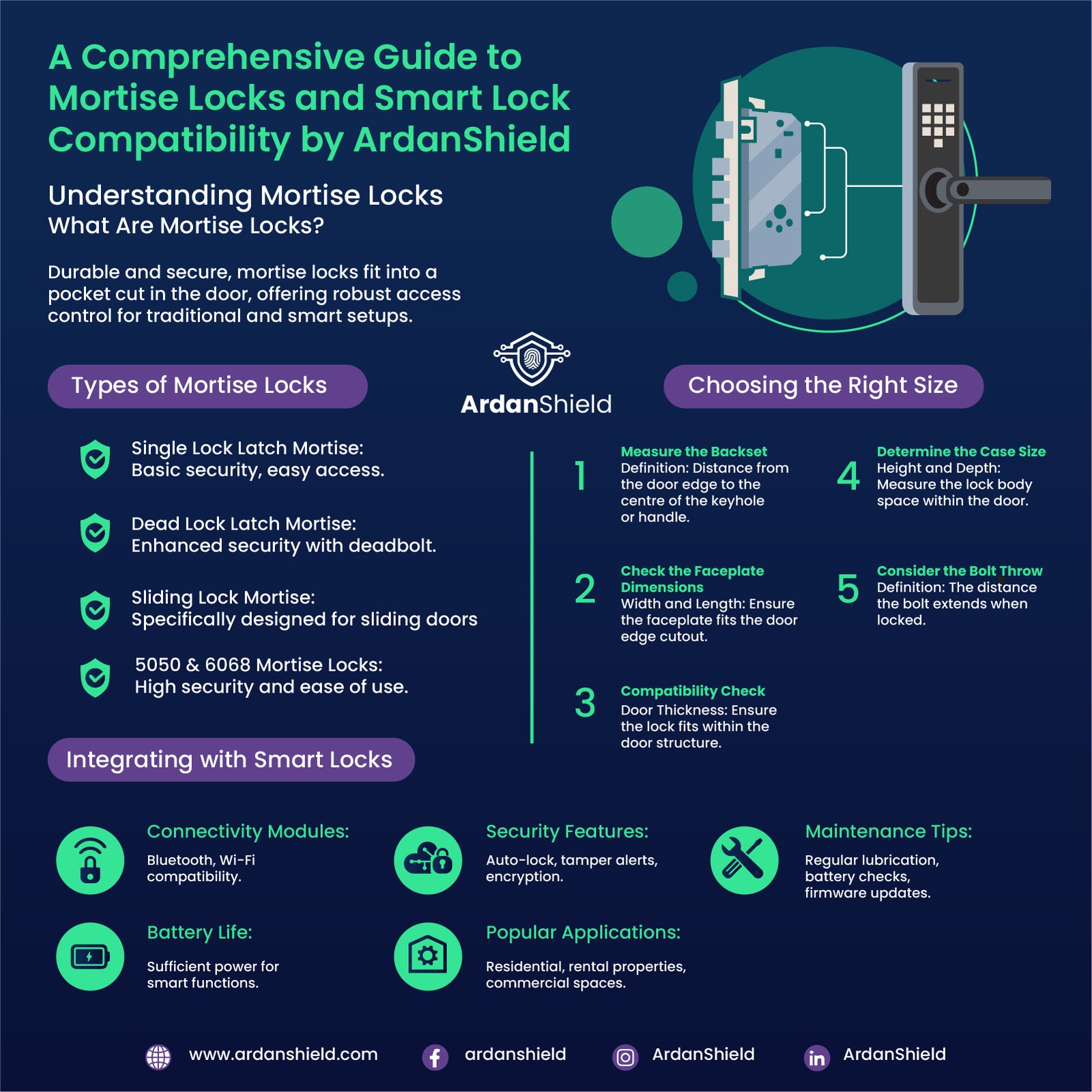Add description, images, menus and links to your mega menu
A column with no settings can be used as a spacer
Link to your collections, sales and even external links
Add up to five columns
Add description, images, menus and links to your mega menu
A column with no settings can be used as a spacer
Link to your collections, sales and even external links
Add up to five columns
A Comprehensive Guide to Mortise Locks and Smart Lock Compatibility
November 15, 2024 4 min read

ArdanShield
A Comprehensive Guide to Mortise Locks and Smart Lock Compatibility
Mortise locks are favoured for their durability and security, making them ideal for both traditional and smart home security setups. This guide will provide a detailed overview of various mortise lock types, sizing options, and tips for selecting the best lock for smart lock integration. Whether you’re a homeowner, property manager, or security enthusiast, this guide will help you make an informed decision on mortise locks that meet your security needs.
Understanding Mortise Locks
Mortise locks differ from standard deadbolt or latch locks because they require a pocket cut into the door where the lock case is fitted. They offer a higher level of security and are compatible with a range of smart lock solutions, providing users with robust access control options.
Types of Mortise Locks
- Single Lock Latch Mortise - Provides basic security with easy access control, making it suitable for entryways that require standard access.
- Dead Lock Latch Mortise - Offers enhanced security through a deadbolt mechanism, ideal for applications where additional protection is required.
- Sliding Lock Mortise - Specially designed for sliding doors, providing keyless locking capabilities without affecting door functionality.
- 5050 and 6068 Mortise Locks - Widely compatible with various smart lock features, these locks provide a balance between high security and ease of use, making them popular choices for both residential and commercial applications.
Mortise Lock Size Options
- 2885, 3585, 4085, 5085, 6085, 7085, etc.: Commonly used in residential settings, these locks vary in dimensions to suit different door thicknesses and security needs.
- 3092, 3592, 4092, 4592: These options often provide additional backset depth for doors that require greater reach.
- For sliding doors, options such as the 2885 sliding and 3585 sliding locks are ideal, allowing seamless operation without compromising security.
Measuring for a Mortise Lock
Accurate measurements are crucial for fitting a mortise lock correctly, especially when considering integration with smart locks. Key measurements include:
- Backset - This is the distance from the edge of the door to the center of the keyhole or cylinder, and it varies between lock models. Backsets are critical to ensure the lock aligns with the door’s existing setup.
- Case Depth and Height - The lock case must fit the door’s mortise pocket without adjustments. Measure the pocket’s depth and height to confirm compatibility with the chosen mortise lock.
- Forend Dimensions - The faceplate’s length and width ensure the lock sits flush on the door edge, which is essential for proper functionality.
- Centres Measurement - For mortise locks with handles, the centers measurement (distance between the keyhole and spindle hole) ensures that the handle and key align.
Choosing Mortise Locks for Smart Lock Integration
- Compatibility with Connectivity Modules - Mortise locks with space for Bluetooth or Wi-Fi modules make it easier to add smart lock features like remote access, guest code generation, and activity monitoring.
- Battery Life and Power Source - Mortise locks often vary in the space available for battery packs. Opt for models with sufficient power capacity to ensure prolonged battery life for smart locks.
- Security Features - Look for mortise locks that support auto-lock, tamper alerts, and encrypted communication for heightened security with smart locks.
Popular Applications of Mortise Locks in Smart Home Security
Mortise locks provide robust security solutions, making them suitable for high-traffic areas, rental properties, and commercial spaces. Here’s how different lock options can be applied:
- Single Lock Latch and 5050 Mortise Locks for main doors in residential properties or rental homes.
- Dead Lock Latch Mortise Locks for higher security in sensitive areas.
- Sliding Lock Mortise Options (e.g., 2885, 3585 sliding) for balcony or patio doors that require seamless operation.
- Smart Home Integration: Many mortise locks are compatible with smart home ecosystems like Amazon Alexa, Google Home, and Apple HomeKit, providing control and monitoring from a central system.
Tips for Maintaining Mortise Locks
- Regular Lubrication and Cleaning - Mortise locks require periodic lubrication to prevent jamming. Use appropriate lock lubricant to maintain the mechanism.
- Battery Replacement for Smart Locks - Check and replace batteries as needed. Mortise locks with battery indicators or alert features can help prevent unexpected battery depletion.
- Firmware Updates - For smart-enabled mortise locks, regular firmware updates help keep security features up-to-date.
Final Thoughts
Mortise locks are an excellent choice for anyone looking to enhance home security with smart technology. By understanding the various types, sizes, and compatibility options, you can select a mortise lock that fits your needs perfectly. With the right lock in place, you’ll enjoy both security and the convenience of smart lock integration.

